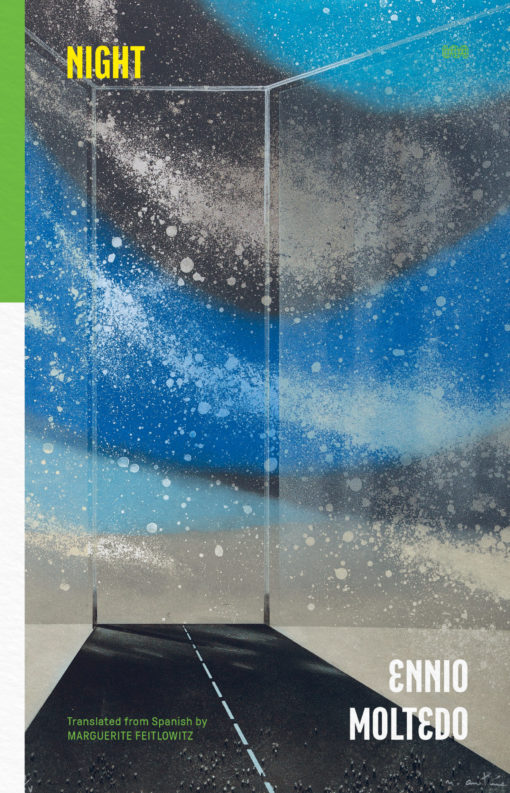by Coco Sofia Fitterman
At what time must the birds lined up in gardens, trees, and cages sing?
Look to the law.
17
Thus begins Night, a collection of 113 prose poems written during Augusto Pinochet’s dictatorship in Chile. Appearing in English for the first time in a beautifully attentive translation by Marguerite Feitlowitz, Night is a collection of scathing, humorous, cynical, at times grumpy, and yet tender poems from one of Chile’s most prophetic poets, Ennio Moltedo. It’s not easy to render rage into beauty, though many poets succeed at doing so. Moltedo’s particular version of rage becomes a poetics of a subtle, searing concision. It hints at an omnipresent inside joke shared with the reader—an awful and cruel one, but one so absurd that you have to laugh at it to survive it.
Anarchist-nihilist-revolutionist—many names but only one father for this son who returns on a bicycle, old and naked, a display ad hanging down his back. (28)
The voice of Moltedo’s Night renders language in its hollowness. Watch how day to day words lose their meaning, the voice seems to insist with each poem, when the language of the law is absolutely absurd, devoid of meaning. Yet there are moments when the speaker expresses, without a veil of sarcasm, real, earnest pain, genuine frustration, questioning into the void: “Can we go on like this?” (24) or “How much longer?” (31) or “Instead of so much eye-rolling and moralistic pouting today, a time of peace, why didn’t you utter a single word in times of death, dickhead?” (70).
Moltedo, born to Genoese immigrants in the port city of Valparaíso, channels the Mediterranean greats—like C.P. Cavafy, who he has been compared to—in descriptions that are at once lush and precise, with imagery of the sea often lurking in the background. But I sense another kinship—with Andalusian-born Federico García Lorca. Both poets seem to have a mythical, almost mystical connection to their roots, the clarity of those places of natural beauty, juxtaposed with the darkness of the political regimes each poet suffered under. I find something Lorcan about Moltedo’s hatred of “urban renewal” projects, common under Pinochet’s economic dictatorship: the big industrial machines coming to build new complexes by the sea, destroying the communities and natural ecosystems Moltedo knew from childhood, in the name of Progress.
Final disaster for this city of shadows where windows gaze inward, and gates are painted with the dead and luminous sea. (83)
Moltedo’s prose poems are haunted by the dead, people murdered directly or indirectly by the regime. There is mention of dead people in almost every poem. His cutting words detail the lividity of the murdered general corpus—the discoloration of the nation’s collective dead body: “The general heart doesn’t beat” (32).
In 2019, protests erupted in Santiago and rapidly spread across Chile. The uproar began with students protesting the recent hike in metro and bus fares in Santiago. The grievances quickly snowballed into a mass expression of citizens’ exhausted discontent with the government’s neoliberal policies that cause gaping wealth inequality across the nation. Among the various graffiti slogans coloring the streets during the uproar, one reads: “El neoliberalismo nace y muere en Chile” (“Neoliberalism is born and dies in Chile”). The 2019-2022 protests, known to Chileans as the Estallido social, resulted in a referendum to rewrite the country’s constitution—a relic of the Pinochet era—that failed to inaugurate any real progressive changes. To this day, the long shadow cast by Pinochet’s dictatorship will not readily loosen its grip on the government, so deeply embedded still is the regime under which Moltedo wrote Night. Moltedo’s voice is ever-relevant to us now, laughing along with the absurdity in order to process the pain of seeing your country destroyed, raising a middle finger to the neoliberalist fucks:
To all you solemn clowns, you exhibitionists of papal bulls and rulings from the bishops, of military orders and epaulets, of teas in high places, to all you crusaders and beribboned fanatics, to all of you who say you hate all this and are only helping the nation to get ahead: I raise my middle finger. (64)
Coco Sofia Fitterman is a writer living in Brooklyn. Her work has appeared in The Brooklyn Rail and Provence magazine, among other publications. Her chapbook Say It With Flowers was published by Inpatient Press in 2017, and she is currently a PhD student of Comparative Literature at The Graduate Center, CUNY.
Night is translated by Marguerite Feitlowitz and published by World Poetry Books.

